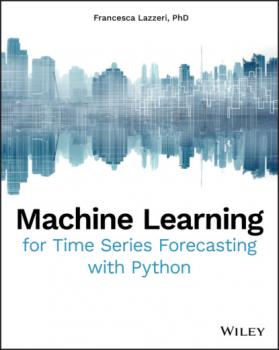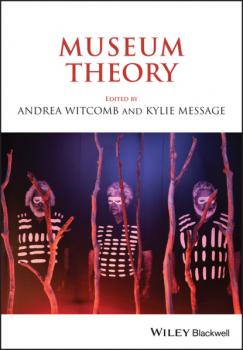John Wiley & Sons Limited
Все книги издательства John Wiley & Sons LimitedMachine Learning for Time Series Forecasting with Python
Learn how to apply the principles of machine learning to time series modeling with this indispensable resource Machine Learning for Time Series Forecasting with Python is an incisive and straightforward examination of one of the most crucial elements of decision-making in finance, marketing, education, and healthcare: time series modeling. Despite the centrality of time series forecasting, few business analysts are familiar with the power or utility of applying machine learning to time series modeling. Author Francesca Lazzeri, a distinguished machine learning scientist and economist, corrects that deficiency by providing readers with comprehensive and approachable explanation and treatment of the application of machine learning to time series forecasting. Written for readers who have little to no experience in time series forecasting or machine learning, the book comprehensively covers all the topics necessary to: Understand time series forecasting concepts, such as stationarity, horizon, trend, and seasonality Prepare time series data for modeling Evaluate time series forecasting models’ performance and accuracy Understand when to use neural networks instead of traditional time series models in time series forecasting Machine Learning for Time Series Forecasting with Python is full real-world examples, resources and concrete strategies to help readers explore and transform data and develop usable, practical time series forecasts. Perfect for entry-level data scientists, business analysts, developers, and researchers, this book is an invaluable and indispensable guide to the fundamental and advanced concepts of machine learning applied to time series modeling.
Communicating the Future
We are facing an unprecedented environmental crisis. How can we communicate and act more effectively to make the political and economic changes required to survive and even thrive within the life-support capacities of our planet? This is the question at the heart of W. Lance Bennett’s much-anticipated book. Bennett challenges readers to consider how best to approach the environmental crisis by changing how we think about the relationships between environment, economy, and democracy. He introduces a framework that citizens, practitioners, and scholars can use to evaluate common but unproductive communication that blocks thinking about change; develop more effective ways to define and approach problems; and design communication processes to engage diverse publics and organizations in developing understandings, goals, and political strategies. Until advocates develop economic programs with built-in environmental solutions, they will continue to lose policy fights. Putting “intersectional” communication into action requires acknowledging that communication is not only an exchange of messages, but an organizational process. Communicating the Future is important reading for students and scholars of media and communication, as well as general readers concerned about the environmental crisis.
The Meaning of Thought
From populist propaganda attacking knowledge as ‘fake news’ to the latest advances in artificial intelligence, human thought is under unprecedented attack today. If computers can do what humans can do and they can do it much faster, what’s so special about human thought? <br /><br />In this new book, bestselling philosopher Markus Gabriel steps back from the polemics to re-examine the very nature of human thought. He conceives of human thinking as a ‘sixth sense’, a kind of sense organ that is closely tied our biological reality as human beings. Our thinking is not a form of data processing but rather the linking together of images and imaginary ideas which we process in different sensory modalities. Our time frame expands far beyond the present moment, as our ideas and beliefs stretch far beyond the here and now. We are living beings and the whole of evolution is built into our life story. In contrast to some of the exaggerated claims made by proponents of AI, Gabriel argues that our thinking is a complex structure and organic process that is not easily replicated and very far from being superseded by computers. <br /><br />With his usual wit and intellectual verve, Gabriel combines philosophical insight with pop culture to set out a bold defence of the human and a plea for an enlightened humanism for the 21st century. This timely book will be of great value to anyone interested in the nature of human thought and the relations between human beings and machines in an age of rapid technological change.
Value
'Value' seems like an elusive and abstract concept. Nonetheless, notions of value underpin how we understand our lives, from discussions about the economic contribution of different kinds of work and productive activity, to the prices we pay for the things we consume. So what is value, and where does it come from? In this new book, Frederick Harry Pitts charts the past, present and future of value within and beyond capitalist society, critically engaging with key concepts from classical and neoclassical political economy. Interrogating the processes and practices that attribute value to objects and activities, he considers debates over whether value lies within commodities or in their exchange, the politics of different theories of value, and how we measure value in a knowledge-based economy. This accessible and intriguing introduction to the complexities of value in modern society will be essential reading for any student or scholar working in political economy, economics, economic sociology or management.
Consumption
Consumption used to be a disease. Now it is the dominant manner in which most people meet their most basic needs and – if they can afford the price – their wildest desires. <p>In this new book, Ian and Mark Hudson critically examine how consumption has been understood in economic theory before analyzing its centrality to our social lives and function in contemporary capitalism. They also outline the consequences it has for people and nature, consequences routinely made invisible in the shopping mall or online catalogue. Hudson and Hudson show, in an approachable manner, how patterns of consumption are influenced by cultures, individual preferences and identity formation before arguing that underlying these determinants is the unavoidable need within capitalism to realize profit.</p> This accessible and comprehensive book will be essential reading for students and scholars of political economy, economics and economic sociology, as well as any reader who wants to confront their own practices of consumption in a meaningful way.
Wealth
The pursuit of wealth has captivated people’s attention for centuries. Yet, as a topic of social research, the way in which wealth is accumulated and unequally distributed has largely been neglected, remaining hidden beneath data on income inequality. Wealth aims to address this blind spot in the academic discourse. In accessible prose, Yuval Elmelech explains how personal wealth differs fundamentally from other conventional measures of socioeconomic status and why it has become increasingly important to our understanding of social mobility and stratification. Crucially, Elmelech presents a dynamic sociological framework of wealth attainment that illuminates the effects of cumulative advantages and disadvantages over the course of an individual’s life, and across generations. He describes how these advantages and disadvantages are in turn shaped by a complex interplay of multiple markets, changing demographic landscapes, and persistent inter-group wealth disparities. Blending theoretical approaches with empirical evidence and macro-level contexts with micro-level processes, this book is an astute guide for thinking about wealth as a key determinant of social and economic wellbeing and for interrogating the role of wealth accumulation in social inequality.
iPhone Portable Genius
Your step-by-step guide to iPhone mastery iPhone Portable Genius delivers a practical and simple guide to quickly learning everything you need to know about the iPhone. Whether you’re a novice user with Apple products or a seasoned pro, you’ll find a wealth of info designed to show you how to configure your iPhone, set up accounts, manage your contacts and appointments, take stunning pictures, and surf the web. All while keeping your identity and accounts private and secure. Before you know it, you’ll be: Mastering the touchscreen Setting up your iPhone to suit the way you work and play Connecting your iPhone to Wi-Fi and setting up your phone as an internet hub Solving the most common iPhone problems Getting the most out of email With straightforward and step-by-step instructions in a portable and convenient package and engaging illustrations, iPhone Portable Genius is the ideal resource for owners and users of one of the world’s most popular phones.
Museum Transformations
MUSEUM TRANSFORMATIONS DECOLONIZATION AND DEMOCRATIZATION Edited By ANNIE E. COOMBES AND RUTH B. PHILLIPS Museum Transformations: Decolonization and Democratization addresses contemporary approaches to decolonization, greater democratization, and revisionist narratives in museum exhibition and program development around the world. The text explores how museums of art, history, and ethnography responded to deconstructive critiques from activists and poststructuralist and postcolonial theorists, and provided models for change to other types of museums and heritage sites. The volume's first set of essays discuss the role of the museum in the narration of difficult histories, and how altering the social attitudes and political structures that enable oppression requires the recognition of past histories of political and racial oppression and colonization in museums. Subsequent essays consider the museum's new roles in social action and discuss experimental projects that work to change power dynamics within institutions and leverage digital technology and new media.
Museum Theory
MUSEUM THEORY EDITED BY ANDREA WITCOMB AND KYLIE MESSAGE Museum Theory offers critical perspectives drawn from a broad range of disciplinary and intellectual traditions. This volume describes and challenges previous ways of understanding museums and their relationship to society. Essays written by scholars from museology and other disciplines address theoretical reflexivity in the museum, exploring the contextual, theoretical, and pragmatic ways museums work, are understood, and are experienced. Organized around three themes—Thinking about Museums, Disciplines and Politics, and Theory from Practice/Practicing Theory—the text includes discussion and analysis of different kinds of museums from various, primarily contemporary, national and local contexts. Essays consider subjects including the nature of museums as institutions and their role in the public sphere, cutting-edge museum practice and their connections with current global concerns, and the links between museum studies and disciplines such as cultural studies, anthropology, and history.
Museum Media
MUSEUM MEDIA Edited by Michelle Henning Museum Media explores the contemporary uses of diverse media in museum contexts and discusses how technology is reinventing the museum. It considers how technological changes—from photography and television through to digital mobile media—have given rise to new habits, forms of attention and behaviors. It explores how research methods can be used to understand people's relationships with media technologies and display techniques in museum contexts, as well as the new opportunities media offer for museums to engage with their visitors. Entries written by leading experts examine the transformation of history and memory by new media, the ways in which exhibitions mediate visitor experience, how designers and curators can establish new kinds of relationships with visitors, the expansion of the museum beyond its walls and its insertion into a wider commercial and corporate landscape. Focusing on formal, theoretical and technical aspects of exhibition practice, this in-depth volume explores questions of temporality, attachment to objects, atmospheric and immersive exhibition design, the reinvention of the exhibition medium, and much more.









